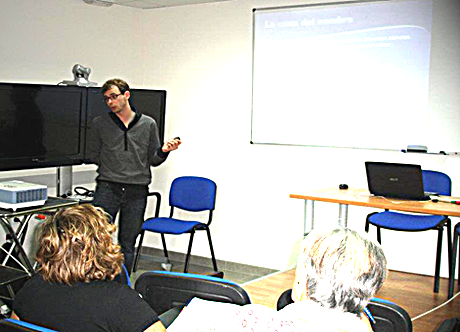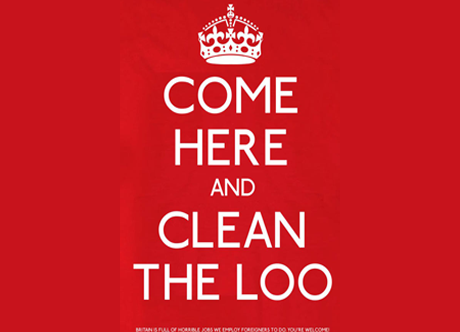M'ha vingut la dèria de la incongrüència perquè resulta que en passar-me d'un treball precari a altre aquí a Londres no vaig tindre la deguda prudència d'informar-me'n de la normativa fiscal i laboral i no vaig demanar la meua P-45: aquí quan canvies de treball has de demanar un paper on l'empresa de la que eixes informa a l'empresa a la que vas (i de pas a la hisenda pública, que és el
HM Revenue) de quant t'ha pagat i quant ha cotitzat per tu. Sense eixe paper (que de fet en són tres) la nova empresa cotitza per tu una barbaritat en un codi d'emergència, per si de cas abans de ser cambrer eres enginyer atòmic o director de multinacional i has de pagar una renda en simptonia. Cobrant el salari mínim, 6,08/hora, suporte una presió fiscal directa, tot comptat, del 34%. Mentres tant
el candidat republicà Mitt Romney guanya tretze milions de dòlars a l'any i diu que paga una mitjana del 13%. I li ha de semblar molt perquè està boig per abaixar impostos.
 |
| Els estudiants de la U. de Suffolk fan uns dibuixets xulos |
A Grècia
un periodista va publicar les dades de 2000 evasors fiscals i la policia no va tardar en reaccionar i detindre... al periodista.
Aquests
conundrums fiscals i el fet que Amancio Ortega pague els
impostos de Zara Online a Irlanda, mentres que
dóna 20 milions d'euros a caritat a Espanya, arreplegant adhesions entusiastes de tota mena, m'ha fet meditar* darrerament sobre competència fiscal ("competència" en la seua acepció econòmica de "pegar-se d'òsties i abaixar preus" no en la jurídica de "a qui li toca perseguir a este cràpula"). La possibilitat que la llei europea atorga d'establir-se en el país que vulgues mentres que cada país té una estructura fiscal diferent genera un incentiu monstruós (en les dues accepcions del terme) per a abaixar els impostos a aquells que poden decidir fàcilment on fixar el domicili fiscal, és a dir grans empreses i rics, mentres s'apujen compensatòriament per aquells que no podem, bàsicament treballadors assalariats, autònoms i xicotets empresaris. I, de bestreta, cada vegada més passar la grossa de la recaptació a impostos indirectes, que són els més regressius i els menys visibles -acontentant així a rics i miops, respectivament.

És impossible mantenir un sistema fiscal en franca competència a la baixa i alhora un estat del benestar mínimament funcional. Pareix obvi, però hi ha gent com Miguel Sebastián, autoanomenat socialista, que estan tan obcecats en demostrar que la funció redistributiva de l'Estat es fa per la via de la despesa i no de la recaptació (ojo, que en això tenen raó) que es despisten de que per la via de la recaptació es fa també molta redistribució... però al revès. És a dir, la recaptació fiscal arreu del món (també autoanomenat) desenvolupat és generalment regressiva, com demostren centenars d'estudis, i per tant redistribueix sí, però de les classes baixes i mitjanes cap a les classes altes. I encara hi ha qui, com Sebastian, defensen un tipus únic de l'IRPF -diguem un 25% o un 30%, tant fa- sigues ric como Amancio o pobre com jo. Això necessàriament faria el sistema més regressiu, encara que s'empenyen en que llevant deduccions i apujant el mínim exempt no seria tan greu. I per què defensen este canvi? Diuen que per facilitar l'enteniment i pagament de l'impost i evitar incentius perversos. [Un exemple: Fa uns anys estava de moda el problema de l'escala. Com
l'IRPF es paga per trams -de tant a tant un 25%, de tant a tant un 30%...- hi havia un incentiu pervers en les fronteres d'un tram a l'altre per amagar certs ingressos i no passar de divisió. Això, no obstant, és més vell que les màquines d'escriure i els vídeos Beta i hui en dia l'estructura de l'impost directe podria i deuria ser contínua i creixent -és a dir tant guanyes, tant et toca i si guanyes mil més, un 0,1% més, o un 0,01% o el que corresponga, segons la pendent de la funció que s'haja decidit. Aquesta pendent seria el que s'hauria de debatre entre polítics i tècnics i el que la ciutadania hauria de poder votar. Per l'amor del nostre senyor, si les iaies tenen facebook i la declaració de la renda no la fa ningú, la fa un programeta d'ordinador via esborrany -la majoria- o programa PADRE.]
És veritat que és possible que un tipus únic no fora catastròfic, si va acompanyat de llevar les deduccions per vivenda i fons de pensions, però és evident que agreujaria la regressivitat del sistema. I a canvi de què? Els defensors del canvi tenen fe en que d'aquesta manera els evasors evadirien menys, supose que basant-se en que ara evadeixen perquè fan una mena de desobediència civil a la progressivitat. Jo sóc menys psicològicament profund en les meues anàlisis: Crec que evadeixen perquè poden. Perquè no se'ls persegueix ni castiga, i, encara més, perquè se'ls faciliten instruments per evadir. Eixe és EL problema fiscal.
 |
| Isak Andin, amo de Mango, explicant quant pensa pagar d'impostos enguany |
I a tot això als rics, plim. Ells no paguen impostos, i quan en paguen ho fan perquè volen i en la quantitat que els ve en gana. Els milionaris (d'euros) tenen paradissos fiscals en llocs exòtics i, a dia de hui, en tots els països moderns i xulos.
En Espanya tenen les SICAV, aberració fiscal que paga un 1% d'impost de societats, però en el Regne Unit també tenen la
City London Corporation que fa que les grans entitats financeres no només paguen el que els rote sinó que fins i tot queden fora de tot escrutini fiscal. Està Suïssa i els més coneguts paradissos fiscals off-shore, com les Cayman o
l'Illa de Mann, que no està on Crist va perdre l'espardenya, sinó en Europa, corona britànica. Però tots els països més o menys juguen a salvar els rics de pagar. Les dades dels rics segons s'autodeclaren a Hacienda són de risa: el 10% més ric està a partir dels 39.000€ a l'any i l'1% més ric a partir dels 99.000€/any. Sí, clar. Òbviament tota la manta de mega-rics no paga IRPF o paga el que li ve en gana. Aleshores, en estos temps de crisi i mesures apocalíptiques, per què no està en el debat públic una bateria de mesures dràstiques per evitar esta monumental estafa fiscal? La meua resposta a això també és senzilla: Perquè no hi ha debat públic, és una paròdia enfocada pels mitjans on els interessa i cega cap el que no els interessa. Però altres defensen una altra resposta més tècnica: Perquè si intentàrem fer pagar més (o algo) els rics se n'anirien on no els tocaren la butxaca. És a dir, l'argument de la competència fiscal per a justificar que deixem que ens la claven. I tornem al problema matriu: No es pot tindre un sistema financer i comercial global i un sistema fiscal local en competència a la baixa amb altres. Què es pot fer? Jo, de moment, m'he apuntat a
ATTAC. He descartat per ara matar rics perquè no tinc kalashnikov propi i sóc un poc gos.
* treballar de cambrer dóna temps per a pensar humilment**. Els maleïts insisteixen en que no puc llegir darrere de la barra, per si ve algun client. Ja veus tu, què tiquis-miquis. Si ve algún client, que s'espere, que jo llisc ràpid!
** els que em coneixeu de temps sabeu que sóc un tipo molt humil. El més humil del món diria jo!

























